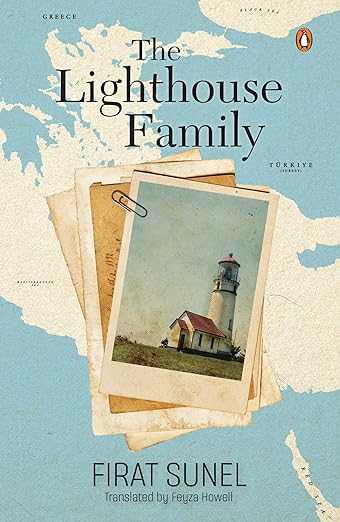Blurb:
Keepers of the lonely lighthouse at Türkiye’s westernmost tip watch in horror as the Second World War sets the Aegean on fire.
Little K feels the weight of the world as he struggles with his desire to go to the city school or help look after the lighthouse as only he can. But his brother Ilyas finds a saintly courage in his limp bones and his sister Feriha becomes the strength of their spine.
While K ploughed the field in the mornings, Ilyas’ learnt the lessons in daylight to help K learn in the flickering beam of the lighthouse; knowing very well that’s the closest he’ll ever get to school. Feriha guarded the lighthouse; knowing she might be the only answer to their struggles. Their aunt Hanim Hala chanted around the mastic tree planted as a sapling: the soul of the home they left behind.
How does their happiest morning turn into an endless night, how does a family with little to do beyond the lighthouse get ripped apart by a war that was not even theirs?
As K says “…I [’ve] realized that emptiness was the worst thing that could fill you.”
The K that grows up from that is an answer to the world that forgets about kindness in its endless pursuit of power.
My Review:
At its core, “The Lighthouse Family” explores themes of familial bonds, sacrifice, and resilience. Even though the story is set in a time of war, the war only acts as a catalyst in the characters’ lives, ever so subtly nudging their lives into a certain direction.
Upon asking a little more about the extent of truth behind the story, Firat Sunel said, “Since it is historical fiction, all the events in the novel are based on real life but not the characters.”
The narrative unfolds through the eyes of the protagonist, a young boy torn between his aspirations for education and the responsibilities thrust upon him to maintain the lighthouse alongside his siblings, Ilyas and Feriha. The tranquility of their existence shatters with the onset of war but not necessarily because of it. The author adeptly weaves a tale of the personal struggles of individuals as they fear for their future.
The most important theme of the story, however, is the sibling relationship. The protagonist, brought up with a typical “boys do this and girls do that” mentality, finds it hard to share his emotions and be more sensitive with his siblings. The struggle is often highlighted by the protagonist himself. As he grows up, he realizes the futility of such barriers, but by then it is too late.
The prose is a tapestry of evocative imagery and emotional depth. Through vivid descriptions and immersive storytelling, the author invites readers into the lighthouse’s world, painting scenes of both beauty and devastation with equal skill. The author’s ‘show, don’t tell’ approach brings to life the lighthouse’s desolate surroundings and the characters’ inner turmoil, fostering a strong emotional connection with the reader. The use of compare and contrast to exemplify an emotion, really caught my attention the most.
The characters in “The Lighthouse Family” are intricately drawn, each carrying their own burdens and aspirations. The protagonist’s internal conflict and growth provide a compelling anchor to the narrative. Ilyas, Feriha, Hanima Hala, as well as the protagonist’s parents, all stand out as strong characters, serving their roles to the best of their abilities. If there is a spin-off to be expected from this book, it has to be about Feriha and Hanim Hala who have much story to tell beyond what is known through the eyes of the protagonist. The lighthouse itself serves as a character of its own — having its own timeline in the world of mortal beings.
Curiously, I asked why the author why he hadn’t used a name for the protagonist, and he told me, “Regarding the name of the protagonist, I did it purposely to make him more internalised by the readers. I do it in my other novels as well.”
“The Lighthouse Family” is a hauntingly beautiful tale. The author’s narrative prowess and compelling characters make this book a highly recommended read, particularly for those drawn to emotionally resonant historical fiction.

